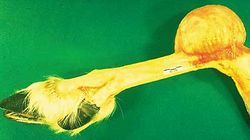Difference between revisions of "Brucella abortus"
| (7 intermediate revisions by 2 users not shown) | |||
| Line 1: | Line 1: | ||
| − | {{ | + | {{unfinished}} |
| − | |||
| − | |||
| − | |||
| − | |||
| − | |||
| − | |||
| − | |||
| − | |||
| − | }} | ||
[[File:Brucelliosis.jpg|right|thumb|250px|<small><center> Swollen caribou “knee” joint due to brucellosis. (Wildlife Alaska | [[File:Brucelliosis.jpg|right|thumb|250px|<small><center> Swollen caribou “knee” joint due to brucellosis. (Wildlife Alaska | ||
2008, Wikimedia commons)</center></small>]] | 2008, Wikimedia commons)</center></small>]] | ||
| − | ''Brucella abortus'' is a species of the ''[[Brucella species - Overview|Brucella]]'' bacteria genus and causes [[ | + | ''Brucella abortus'' is a species of the ''[[Brucella species - Overview|Brucella]]'' bacteria genus and causes [[Bovine brucellosis]]. |
| − | ''B.abortus'' uncommonly localises in joints, usually in | + | ''B.abortus'' uncommonly localises in joints, usually in '''carpal bursitis (hygroma)''' in cattle and '''bursitis''' in horses. |
| + | |||
| + | It affects cattle, transmission is by ingestion and abortion occurs in the last half of pregnancy. The placenta is covered by fibrinonecrotic tissue and the foetus often shows bronchopneumonia. | ||
==Control== | ==Control== | ||
Vaccination of heifers against ''B. abortus'' in endemic regions by Strain S19, a live attenuated vaccine, stimulating a cell-mediated immune response. The vaccination of young animals interferes with serological testing. The 45/20 bacterin vaccine is less effective and the newer RB51 vaccine has no LPS O-antigen therefore not detected by serological tests and gives good protection. | Vaccination of heifers against ''B. abortus'' in endemic regions by Strain S19, a live attenuated vaccine, stimulating a cell-mediated immune response. The vaccination of young animals interferes with serological testing. The 45/20 bacterin vaccine is less effective and the newer RB51 vaccine has no LPS O-antigen therefore not detected by serological tests and gives good protection. | ||
| − | |||
| − | |||
| − | |||
| − | |||
| − | |||
[[Category:Brucella species]] | [[Category:Brucella species]] | ||
| − | + | [[Category:To_Do_-_AimeeHicks]] | |
| − | [[Category: | + | [[Category:To_Do_-_Review]] |
Revision as of 13:18, 22 July 2010
| This article is still under construction. |
Brucella abortus is a species of the Brucella bacteria genus and causes Bovine brucellosis.
B.abortus uncommonly localises in joints, usually in carpal bursitis (hygroma) in cattle and bursitis in horses.
It affects cattle, transmission is by ingestion and abortion occurs in the last half of pregnancy. The placenta is covered by fibrinonecrotic tissue and the foetus often shows bronchopneumonia.
Control
Vaccination of heifers against B. abortus in endemic regions by Strain S19, a live attenuated vaccine, stimulating a cell-mediated immune response. The vaccination of young animals interferes with serological testing. The 45/20 bacterin vaccine is less effective and the newer RB51 vaccine has no LPS O-antigen therefore not detected by serological tests and gives good protection.
